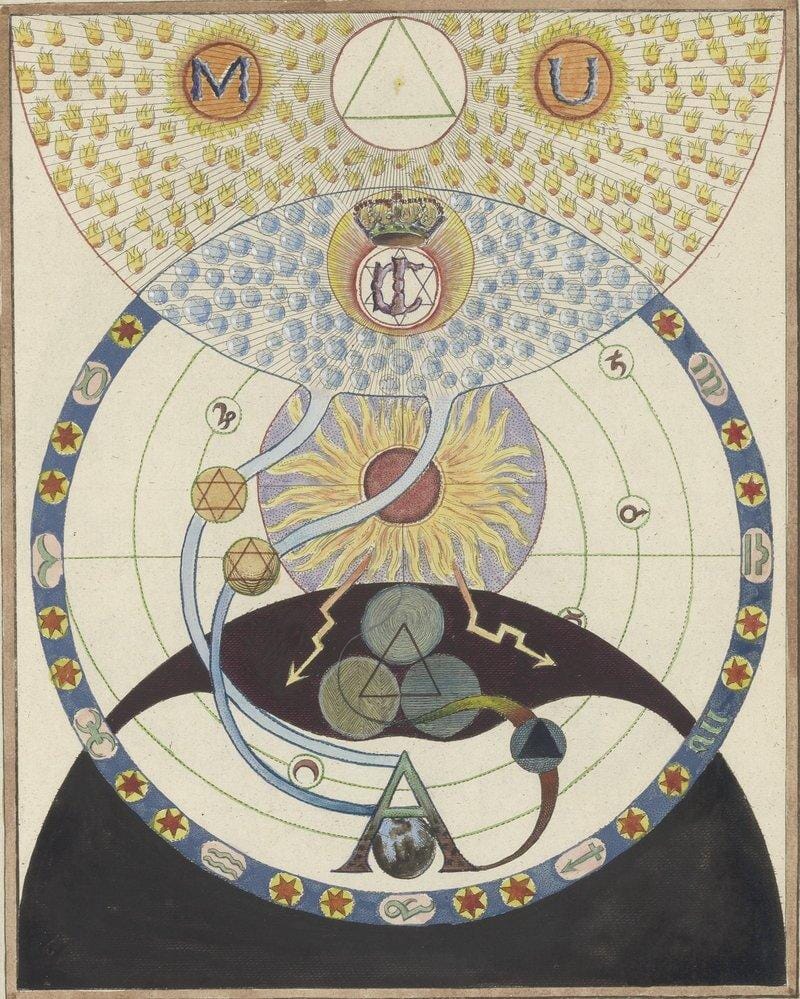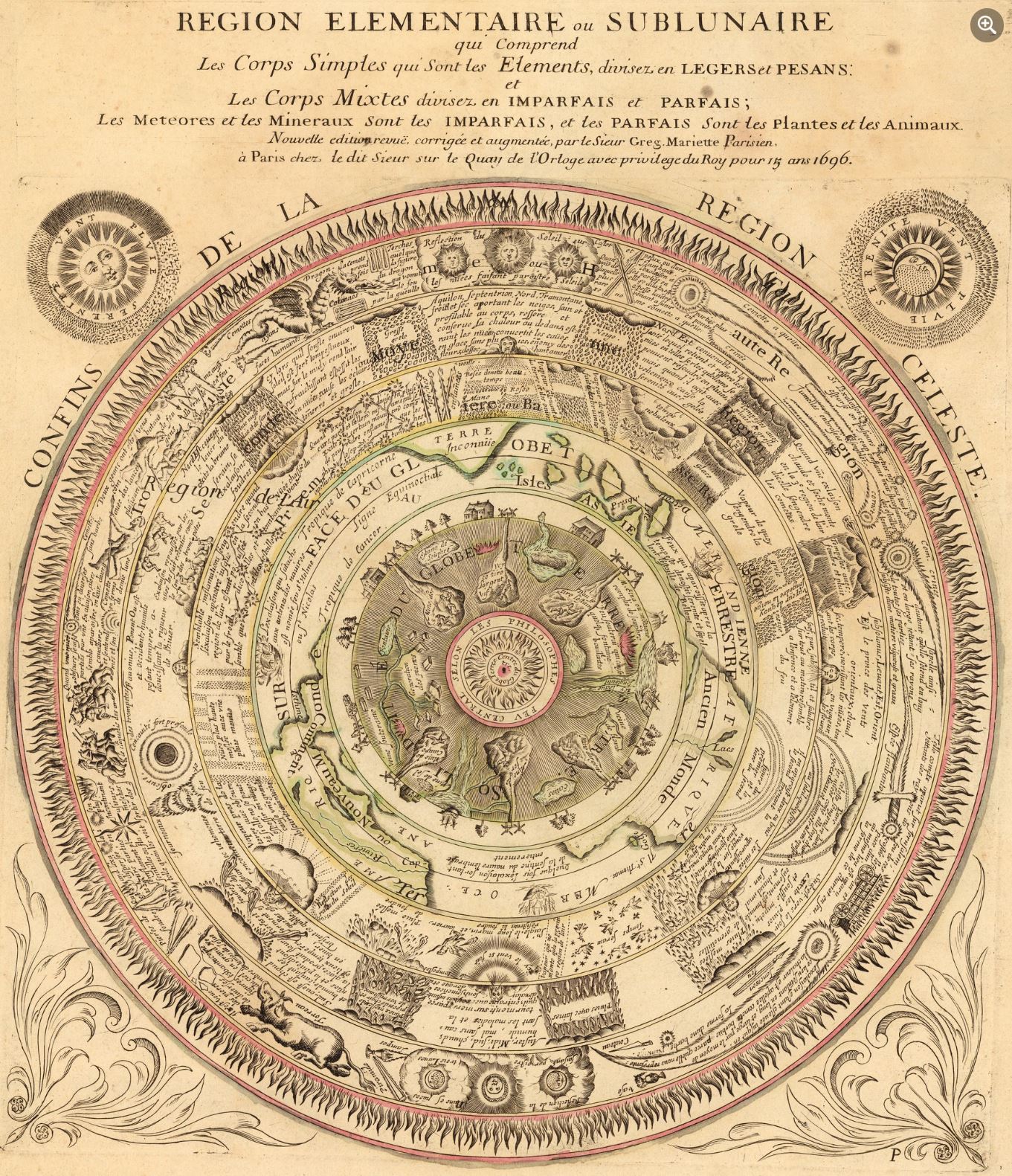In the Corpus Hermeticum, Heimarmene is explicitly described as the “governing circuit of the stars,” the chain through which the Divine intellect structures the material world. It is the order (taxis) of the cosmos: an intelligent and binding necessity.
Heimarmene (εἱμαρμένη, from meiromai, “to receive one’s portion”) is the chain of causation, the web of necessity that keeps the cosmos coherent. It is the Law that governs the turning of the spheres, the mathematical correspondence between causes and effects. In Hellenistic and Gnostic thought, it is what makes the stars move and men repeat their actions, akin to a movement within a closed loop. It is the divine clock when seen from without and the prison of the soul when seen from within. It is the circle of fatum, anánkē (ἀνάγκη), which drags all things along with it.
In the process of awakening consciousness, one may say that Heimarmene corresponds to the automatic motion, the mechanism of the heavens. This what traditional astrology mirror through the fatalistic primary directions and zodiacal cycles, the rotation of the cosmic wheel where the primum mobile remains unseen. In Aristotelian and later Ptolemaic cosmology, the primum mobile (“first moved” or “first moving sphere”) transmits motion to all lower spheres, the firmament, the planetary orbs, and finally the sublunary world. It is unseen, because it contains no body or light of its own; it is pure motion, the impulse of Divine Will expressed as rotation. In Christian scholasticism, it became associated with the angelic order of the Seraphim or with the Motus Dei, the Divine act that sustains creation.
But Pronoia – from pro (“before”) and noein (“to perceive, to think”) – is the mind that conceives that circle before it turns. Where Heimarmene governs by necessity, Pronoia moves by intention. It is Divine thought in its anticipatory form, the intelligence that imagines order before the machinery even begins to spin. If Heimarmene is the wheel itself, Pronoia is the idea of the wheel, the still thought that gives purpose to motion.
And, if Heimarmene is the body of the cosmos, then Pronoia is its spirit. It arises when the soul awakens at the centre of that rotation and realises that destiny itself is language and can be worked with as a musician becomes part of a larger orchestra fated to play a specific sort of sound. Planets, signs, houses and aspects become letters and sigils of a partiture. Also, in the Gnostic texts (especially Trimorphic Protennoia and the Valentinian or Sethian writings), Pronoia is the Voice from the Height that descends into the machinery to awaken it. It is Christ entering the sphere of the spheres, breaking the tyranny of Heimarmene from within.

The suffix -noia (νόια, from noein, “to perceive, to think, to apprehend with the mind”) also unites both Pronoia and Metanoia. It names the activity of the nous itself, the faculty of Divine intellect that conceives and remembers. In the Hermetic schema, Pronoia is the descent of the divine Mind into the world, the Logos giving order to chaos, the “before-thought” that sustains the cosmos. The word μετάνοια (metanoia) derives from meta (“after”, “beyond”, “across”). However, in classical Greek, it also carries the more concrete nuance of changing one’s mind, turning one’s thought, or quite literally turning the head, as in the symbolism of The Sun in the Tarot. Thus metanoein means, quite literally, “to turn the nous,” or “to orient the mind in another direction.”, as the man in Plato’s cavern does so when looking towards the true Light.
In the Greek Gospels, when John the Baptist and Christ proclaim μετανοεῖτε – metanoeîte -, the word bears none of the later tones of guilt or moral contrition. The cry of John in Matthew 3:2, «Metanoeîte; ēngiken gar hē basileia tōn ouranōn – “Turn your minds, for the Kingdom of the Heavens has drawn near”; and Christ’s first public words in Matthew 4:17, «Metanoeîte; ēngiken gar hē basileia tōn ouranōn – “Turn your minds, for the Kingdom of the Heavens has drawn near”, both summon a turning of perception, a revolution of the nous – a re-volutio in the original sense of the word, from the Latin revolvĕre, “to roll back, to turn again,” the circular motion of return. It the mind turning upon its own axis, as the heavens themselves do, rediscovering in movement the path back to stillness. It is a command to lift our eyes from the plane of repetition to the axis of the real, as if, within the circle of Heimarmene, one were finally to turn the head toward the centre and recognise that the movement was never a prison but a mirror.
This turning of the mind is the human echo of a greater cosmological rhythm, the same double current that orders the universe. In this movement, where Heimarmene marks the descending current, the flow of Spirit into density – the involution of eternity into time – and Pronoia signifies the ascending current, the intelligent return of all things toward their source, we also recognise the ceaseless dialogue between the Infinite and the Finite that Jacob Böhme envisioned: the descent of the Infinite into limitation, and the ascent of the limited back into the Infinite, the Macrocosm mirrored in the Microcosm through the mediating Son, the mercurial Christ-Logos who unites both realms in a single act of living reciprocity.
Therefore, a traditional astrologer must hold this ethic at the centre of his art. To study the heavens without understanding this double motion is to mistake the map for the mercy that sustains it. He must read the circles of Heimarmene as symbols through which Pronoia speaks and Metanoia awakens. Yes, the cosmos turns with mathematical precision, but the astrologer’s task is not mere submission to mechanism but participation in meaning. They stand between the Infinite and the Finite, aware of the apparent prison of the spheres yet moved by the knowledge that each revolution is an act of Grace. The craft is to interpret necessity as revelation, to recognise in every direction and every aspect the whisper of return. The true astrologer is an agent of Pronoia and Metanoia alike, a servant of that intelligence which, through the language of the stars, invites the soul to remember its own Divine motion.
Κύριε ελέησον
